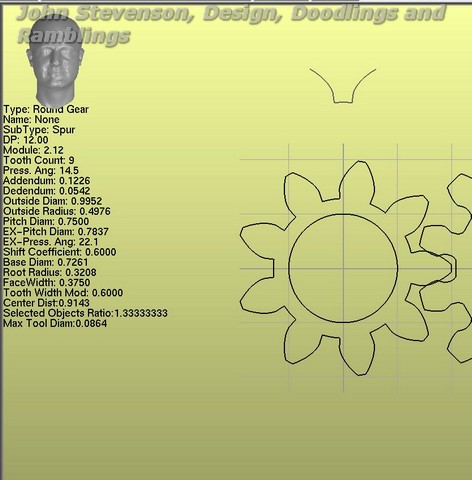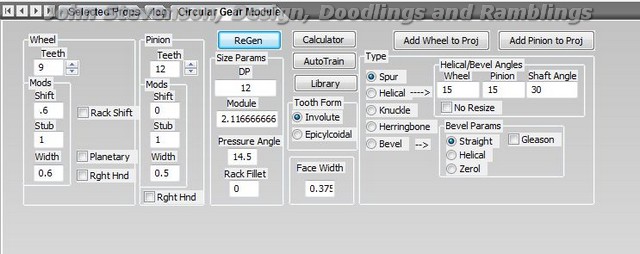Page 1 of 5
Problem Encountered; need advise
Posted: Sun May 17, 2015 10:37 am
by Hwingo
Hey Guys,
I believe I have encountered a problem.
The gear I desire to duplicate has a measured OD of 0.995?. When Gearotic produces the gear it lists the gear as one having an OD of 0.9167?.
The original gear?s PA = 14.5
The Diametral Pitch is 12
Tooth Count is 9 teeth
Face Width is 0.800?
When ?filling in the blanks? in the program, the OD of the spur gear that Gearotics suggest is smaller by 0.0783?
What am I suppose to do when there is a disparity between the OD of the original gear and the OD given by Gearotic?s program?
Harold.
Re: Problem Encountered; need advise
Posted: Sun May 17, 2015 11:05 am
by Ken_Shea
Harold,
What about changing the DP to accomidate and adjust wheel width for sufficiant back lash.
In this case 11 for 1" or 11.05 for .995
Small gears with low tooth count don't seem to always play nicely.
Ken
Re: Problem Encountered; need advise
Posted: Sun May 17, 2015 1:36 pm
by Hwingo
Ken_Shea wrote:
Harold,
What about changing the DP to accomidate and adjust wheel width for sufficiant back lash.
In this case 11 for 1" or 11.05 for .995
Small gears with low tooth count don't seem to always play nicely.
Ken
Uh ??. I really don?t understand that concept. Of course, I?m new to this. I thought meshing of gears must be quite accurate. I wouldn?t have thought that meshing 11 pitch with 12 pitch would be compatible. Seems there would be the potential for stripping gears and/or severe wear. Perhaps even a risk of ruining an entire train and/or shafts.
Harold
Re: Problem Encountered; need advise
Posted: Sun May 17, 2015 1:45 pm
by Ken_Shea
Harold,
Meshing precision can be necessary but not always, like most things, depends on the end requirement.
Perhaps try one and see how it goes, maybe playing with the width can improve the disparity.
Art will be along in time I am sure with better info for you.
Ken
Re: Problem Encountered; need advise
Posted: Sun May 17, 2015 2:03 pm
by ArtF
Hi Harold:
Hit the calculator button at that point and tell it you want a .995 diamter, it will then show you the required DP would be 11.05
Now if your original gear you wish to duplicate is actually .995, its either a DP 11.05, or its nonstandard for other reasons such as profile shift. Your about 1mm off on the radius, which is pretty large. Can it be the original gear is not spec'ed properly at a dp of 12? The sizes follow pretty specific formulas, so unless its special in some way it should be .9167" in diam. with those specs. Do you know for sure the dp of 12 is correct? While its not unusual to be a small amount off because some makers use varying addendum levels, usually this would be a trivial amount. Your off by more than a trivial amount.
Usual formula for diameter of a normal spur is (teeth+2)/DP so for your gear
(9+2) / 12 = 11/12 = .916666 as gearotic reports. Something seems wrong with the spec..
Art
Re: Problem Encountered; need advise
Posted: Sun May 17, 2015 3:43 pm
by Hwingo
Hey Guys,
Thanks for replying. Please allow me to dwell on this over night. However, one last question, the stock is set up on the mill. What's the chances of cutting this gear and it meshes? I don't mind the gear's dia being a wee bit smaller as this will only slow down the wheel a bit but I would want the teeth to mesh. In your opinions, will the "wayward" gear mesh?
Harold
Re: Problem Encountered; need advise
Posted: Sun May 17, 2015 3:57 pm
by Ken_Shea
Harold,
I believe you can print to scale of the two DP's and then compare them.
This is one of those rare instances where it would be handy to have seperate inputs for wheel and pinion.
Re: Problem Encountered; need advise
Posted: Sun May 17, 2015 4:22 pm
by Hwingo
Ok Ken,
I will attempt to print to scale. Guys, you will soon learn that I am not very computer savy. Thanks again for the tip.
Harold
Re: Problem Encountered; need advise
Posted: Sun May 17, 2015 11:17 pm
by ArtF
Harold:
It depends on your center distance. Since the gear is smaller than your original, ( by 1mm on the mesh side), it will likely run fine,
thought the mesh will not be on the pitch line. If there is a large load to this gear it will then wear faster than normal, but it was often
done this way to add backlash. Its preferable to make the tooth a bit less wide for backlash, but making the center distance larger
( which is the effect youll get with that one your cutting) will "probably " work fine.
Most gears are more forgiving than youd think.. unless your in a transmission or a heavy load device.
Can you tell us anythign about the meshing gear? Its diameter and tooth count would do.. It may be that your
gear is really a DP of 11, and is just mislabeled, that woudlnt be unusual either. Its very hard to tell you it WILL or
WILL NOT, simply because the meshing gear is a totasl unknown. I think a full DP is a large change in tooth size
for joining to another gear.. Perhaps its better for example to cut two gears and replace both using the center distance
to recompute the two gears.
Check the gear it will be meshing to, add 2 to its toothcount and divde by the diameter, is it also a DP of 11 if measured that way?
Art
Re: Problem Encountered; need advise
Posted: Mon May 18, 2015 5:20 am
by Hwingo
Good morning guys. Art, I will respond to your last post shortly. I want to show you the results of my endeavors. Am including 3 images.
Harold
Re: Problem Encountered; need advise
Posted: Mon May 18, 2015 5:34 am
by ArtF
HI Harold:
Not bad..but I think your reporting the tool as a bit smaller than it is. Id tell the program its diamter is about 5% larger. The teeth are too narrow I think.. ( Unless thats on purpose, like you used .45 or something for width. It looks like a half decent 14.5PA gear otherwise , just a bit thin in the tooth, and due to the undercut the root wall routine couldnt clean up the root real well, wont matter in those delrins though.
Art
Re: Problem Encountered; need advise
Posted: Mon May 18, 2015 6:35 am
by Hwingo
Art, it would be likely helpful to explain what I am doing and to show a couple of images.
Originally, I began by fabricating a heavy duty rotisserie that would support a whole pig and that includes 12 to 14 hours of non-stop turning-time over a fire. The motor is a Dayton (AC/DC) gear reduction motor (RPM 6.7, torque 162 in/lbs). The large wheel is a fly wheel from a 1985 Chev, 350 cu in engine, and the pinion gear on the Dayton motor is one that was originally designed to fit a starter motor and turn the engine?s fly wheel when starting the engine. This has worked quite well.
Next I decided to make the rotisserie device a ?double duty? contraption by turning it into a welding positioner that would slowly rotate a round part while I am welding (TIG, MIG, Spool, or Stick). I reasoned that if the rotisserie would easily support a hog, then it would surely support, say, a 4? piece of thin-wall-tubing that?s no longer than 12 inches.
The problem with which I?m faced is, the pinion and wheel are metal thus arcing between the gear?s teeth would likely occur when welding. Additionally, since the bearings are also metal, this too would create an electrical potential for arcing and welding together. Too, the motor needs to be isolated from the electrical welding circuit.
I needed a way to isolate and eliminate all electrical potentials so I decided to isolate the motor by using a Delrin pinion gear, as well as a plate of phenolic material between the motor?s metal base and the positioner with further isolation via phenolic spacers through the holes where the bolts secure the reduction motor. Additionally, I have chosen to remove the bearings (x2) and replace the bearings with Delrin bushings. Placing electrical brushes in close proximity to the part being secured in the chuck, I believe this will significantly reduce electrical potentials throughout the positioner?s frame.
Fabricating a new fly-wheel to match the pinion is not an option. I think the fly-wheel has somewhere around 134 teeth. Since the motor turns soooo slowly, and the fact that the weight of the tubing being welded is so slight, I will get quite a few miles of service from the Delrin gear.
In passing, I used gear-pitch gages (20 and 14.5 PA) to *initially* determine the PA and DP followed by careful measurements and math to corroborate the determined PA and DP.
Since the pinion gear is sintered, I assume the gear is proprietary and not a standard gear.
I am including a frontal view of the original pinion gear and an image of the rotisserie/positioner. One can easily see that *form* of the original gear is significantly different than the one I fabricated.
Finally, the Delrin gear seems to nicely articulate with the ?wheel? so I am in hopes this attempt will work. The proof is in the pudding.
Harold
Re: Problem Encountered; need advise
Posted: Mon May 18, 2015 7:00 am
by ArtF
HI Harold:
Yeah, I think youll be fine. Definitely a special gear, looks like a 30PA with a profile shift of -.5
But I think your fine.. that type of application should be fine with that gear. Congrats..
Art
Re: Problem Encountered; need advise
Posted: Tue May 19, 2015 3:58 am
by JustinO
MmmmMmMm!
I used to cook 150-200 lb hogs on a spit at 300-350 f for 10 hrs or so, but it was too much work and tension. There were just too many things that could go wrong. The pig would start falling apart before it was done, the hams and loins would start to dry before the shoulders were done, the fire had to be perfect -- lots of radiation but not too hot. The presentation was kind of ugly. Never had a bad fire, but there was always a charged hose right there.
Over the years the spit and pit have gone away, and the process has become a BBQ cook at 215 f for 15+ hrs in a converted oil tank. The fire is indirect and can be controlled easily, the pig isn't moving and so doesn't lose its juice, the only bad thing is the skin is inedible -- like a giant lobster shell. The hams and loins are tender and exploding with juice, and the shoulders are nicely rendered. Presentation is perfect, and the bones come out without tools. I get smoke ring 2" deep.
For smaller pigs -- <100 lb, the rotisserie roasting works great. I have a chain drive between the shaft and the speed reducer, and I drive the speed reducer with a belt drive from a tiny fractional hp motor. The pig turns at about 1 rpm.
Re: Problem Encountered; need advise
Posted: Tue May 19, 2015 11:37 am
by John S
Will this do you Harold ?

Ticks all your boxes and looks like the original.
You need a shift of 0.6 and 0.6 on the width.


